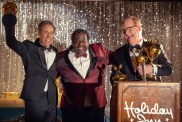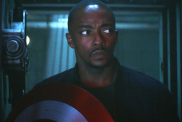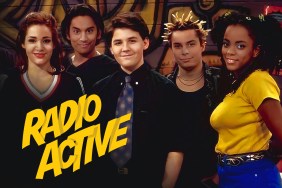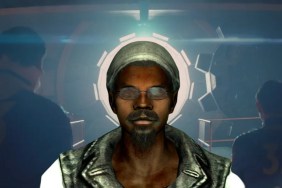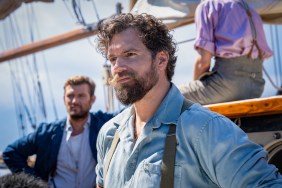Cast:
Philip Seymour Hoffman as The Count
Tom Sturridge as Carl
Nick Frost as Dave
Bill Nighy as Quentin
Rhys Darby as Angus
Talulah Riley as Marianne
Kenneth Branagh as Sir Alistair Dormandy
Jack Davenport as Twatt
Tom Brooke as Thick Kevin
Chris O’Dowd as Simon
Will Adamsdale as News John
Ralph Brown as Bob
Rhys Ifans as Gavin
January Jones as Elenore
Gemma Arterton as Desiree
Emma Thompson as Charlotte
Katherine Parkinson as Felicity
Ike Hamilton as Harold
Stephen Moore as Prime Minister d
Michael Thomas as Sandford
Bohdan Poraj as Fredericks
Sinead Matthews as Miss C
Tom Wisdom as Mark
Michael Hadley as Mr. Roberts
Charlie Rowe as James
Lucy Fleming as Mrs. Roberts
Directed by Richard Curtis
Summary:
Richard Curtis’ latest is mostly a fun seaside romp, though it tends to get bogged down by the excessive number of characters and storylines.
Story:
During the ’60s, when popular music only received an hour on the government-funded British radio stations, groups of individuals ran pirate rock radio stations on ships stationed in the North Sea. A young man named Carl (Tom Sturridge) is sent to his stay with his godfather Quentin (Bll Nighy) who is the captain of one such ship, manned with a motley crew of sex-crazed DJs.
Analysis:
Having made his name synonymous with the Britcom phenomenon, Richard Curtis decides to tackle something slightly more ambitious with a story based on a period of his own childhood when rock ‘n’ roll was still in its infancy and British radio wasn’t the bastion of popular music that it is today.
Curtis allows the viewer into this world through the eyes “Young Carl,” played by Tom Sturridge, sent to spend some time on the ship with its godfather, the ship’s captain Quentin, and he’s immediately taken under the wing of his motley crew of DJs who turn every day into “WKRP at Sea.” At the same time as Carl is learning the ropes on the ship, a British minister played by Kenneth Branagh is trying to take the pirate rock radio station off the air by any means possible. Otherwise, the film consists of a number of vignettes mostly revolving around Carl, but often drifting to some of the other characters.
It’s clear that Curtis has a great love for the pirate rock stations of his youth, but this is his glamorized fantasy version of what must have taken place on those boats with lots of wacky and quirky characters bonding over music and alcohol with little semblance of reality. The station’s top DJ is Philip Seymour Hoffman’s “The Count,” that is until Rhys Ifans’ super-cool veteran Gavin returns to the ship causing friction and a not-so-friendly rivalry with the Count. Nick Frost’s sex-crazed Dr. Dave plays a large part in Carl’s growth, first trying to deflower him with his girlfriend, the super-sexy Gemma Arterton–one of the funnier scenes in the movie–then later cockblocking the young man just as he’s about to get lucky with Quentin’s niece Marianne, played by up ‘n’ comer Talulah Riley. It’s a strange dichotomy for the character to seemingly be trying to help the boy one moment than causing him such turmoil the next, but maybe that’s meant to be a part of that whole free love thing of the ’60s. (There’s actually a creepy almost pederast nature to the character later as he’s lovingly embraced by underage schoolgirls later in the movie.) There’s also the ship’s poor schmuck Simon who gets his own subplot when he marries his sweetheart, played by January Jones, and other featured characters include a less-defined New Zealand DJ played by Rhys Darby and the aptly named Thick Kevin, played by Tom Brooke.
Clearly, Curtis has assembled a fun ensemble cast, but there are just way too many characters and subplots for the movie to have any focus, especially with most of the characters acting as comic relief. (Apparently, the British edit of the movie was even longer!) Halfway through the movie we’re introduced to the long-bearded late night DJ named Bob, completely unaware that he will play a pivotal role in Carl’s story, but some of the other characters are even less relevant so it’s never clear why they even have screen time.
Even so, the entire movie is relatively sweet and cheery, a nice change from the cynical, snarky nature of a lot of modern British comedy, but there never really seems to be much conflict except for the danger of being shut down by the government, which mainly involves Branagh and Jack Davenport complaining about the radio DJ’s exploits. Just when you think nothing is going to happen with that, the ship runs afoul of the weather while trying to escape from the authorities, ending with a scaled-down “Titanic” set piece that one knows will turn out fine since we can’t imagine Curtis would ever allow the tone to get too dark.
Working Title’s resident music supervisor Nick Angel is put through his paces trying to clear all the ’60s rock classics that makes for a fun soundtrack. One thing Curtis does that gets tiring to the point of annoyance are all the montages that cut to various people listening to the station and reacting to what is happening, either laughing at The Count’s antics or dancing to whatever music is being played. As if there wasn’t enough light and frilly fare throughout, Curtis ends the movie with a big dancer number, which would have been fine if he had a cast with any sort of grace or dance moves. Trying to pull off something like this on a boat is just plain awkward.
The Bottom Line:
While the movie is perfectly harmless fun, the lack of focus due to the unwieldy number of characters keeps it from ever being something more than a movie for 40-something women looking to relive their teeny bopper years.


